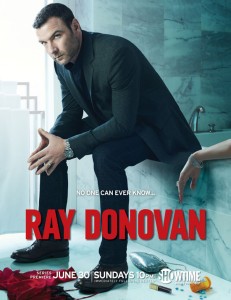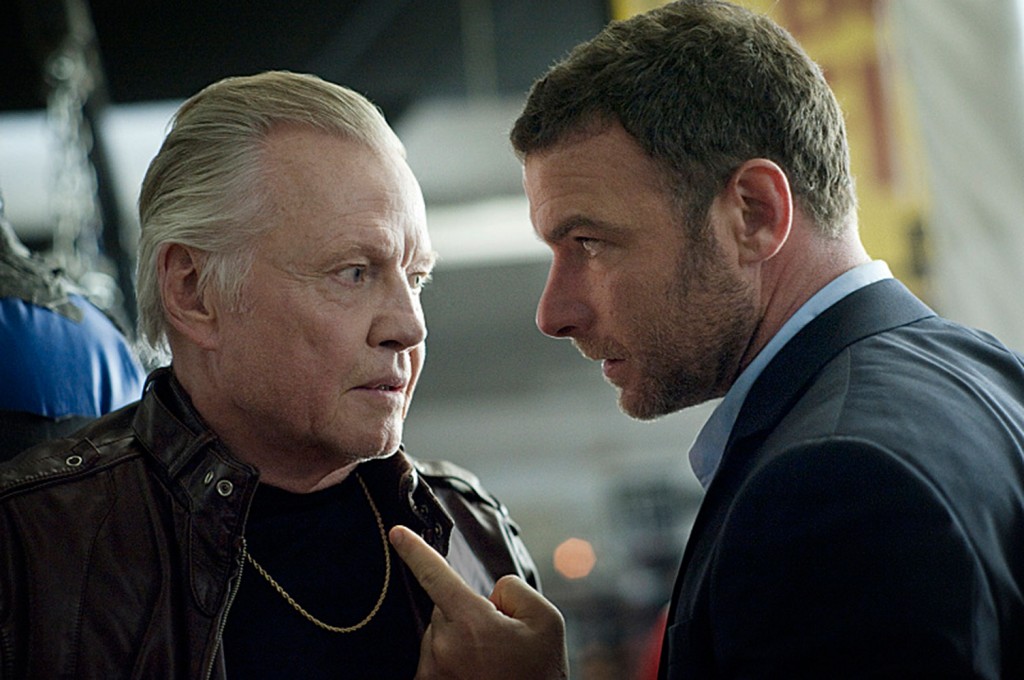TV Review: “Ray Donovan” — “Don’t Let The Wolf in the Gate.”
All things considered, Ray Donovan is bad and only a Tootsie Pop-class sucker would consider tuning in for the second episode.
By Daniel Raphaelson
I had high hopes for the Showtime cable series Ray Donovan. Why? I should say that I had faith in its creator, Ann Biderman, who co-wrote both the gem that is Primal Fear and the shiny pebble that is Copycat. I should tell you that Homeland made a Showtime fanboy of me or that I’ve been in club Voight since 1969’s daring Midnight Cowboy (which I saw last Tuesday.)
The truth, I now realize, is that I just like fixers. The Wolf in Pulp Fiction, Mike from Breaking Bad, Michael Clayton in that movie with the nonsensical title: these characters are ambassadors to the world of upper-class shadiness, and who could help but love them for it? They’re collected, they’re connected, and they know things an honest person wouldn’t. Watching them work is a learning experience for clients and audiences alike.
Had Ray Donovan delivered on the fixer front—had it fulfilled its promise of a glimpse at corruption—I could’ve looked the other way on a host of other problems. This was never supposed to be high art, so I can stomach a “say-don’t-show” approach to exposition, a total lack of character development, and downright lousy acting if the slack is picked up by those less intellectual elements story: suspense, action, and comedy. Sadly, Ray Donovan seems to have more serious ambitions; the first episode played out flatly, melodramatically, and with none of the sizzle you’d expect from the premise.
In the interest of avoiding a lengthy recap of an utterly useless plot, suffice it to say that Ray is a fixer for a pair of Hollywood lawyers, and his personal life is a mess. Just a huge mess. For every friend or relative introduced, there’s a whole separate sack of issues in need of resolving, and we can expect them to be processed via the now established Ray Donovan method of plot advancement: transparent foreshadowing, limp execution, and blatant recapping. If I seem comfortable glossing over the details here, it’s because they are ridiculous. These are not real people, and their fake story is not well told, so why should any of us care? If we wanted to sit down and listen to dumb lies for an hour, we could go down to the bar and ask Lefty about his Canadian girlfriend.
I took a whole page of notes while I was watching the program, but I’m finding it unnecessary to work any of them in here. What are a few lame accents, cheesy lines, and incongruous scenes when the whole spirit of the show was lost on me? If I had to break down the problem (and I kind of do, otherwise I’m just griping at you), I’d say that in its effort to maintain clarity, the show keeps the viewer an uncomfortable two steps ahead of the characters. Being one step behind is a ton of fun, as we’ve seen every time Sam Spade has an ace up his sleeve. Being a step ahead can be fun too, like when Laurie Strode strides towards a lurking Michael Meyers. When traversing territory as familiar as Ray Donovan, however, the experienced TV viewer will tire of waiting for the cast to catch up. Not every show needs to string “eureka” moments together like BBC’s Sherlock, but in the absence of legitimate drama, a tiny revelation or two might have been a thoughtful consolation prize.
All things considered, this show is bad and only a Tootsie Pop-class sucker would consider tuning in for the second episode. Like Boss and The Killing, Ray Donovan is little more than a few violent shake-ups strung together with tired backstory, gratuitous sexuality, and a few shots zany enough to seem artistic. This is the age of House of Cards, Biderman! Your fixer needs a fixer!



I watched the whole season, and to be honest these flaws you describe come and go as the season progresses. Some episode are just like the RD of old, some of them don’t really go anywhere. Mickey’s character goes interesting places, and Voight’s acting remains top notch the whole way through. Connor’s character has a few scenes where he’s actually likable and his sister seems to fall into the background as she heads off to NYU. The boxer character (can’t even remember his name the actor was so bad) does eventually have a purpose, somewhat. But it all somehow falls flat.
Ultimately though the finale has a disappointing resolution: Ray comes up with a fix that is too simplistic and unrealistic. I guess this is because the writers painted themselves into a corner plot-wise with no other way out. For instance, Abby has cancer then all of a sudden has a miraculous recovery in the last 10 minutes (spoiler or not, what was the point of this???).
Even the more subtle aspects of the show, for instance the metaphors and those zany artistic shots, were a little ham fisted or blatantly clumsy. Hopefully, next season if there is one will return to the old format.